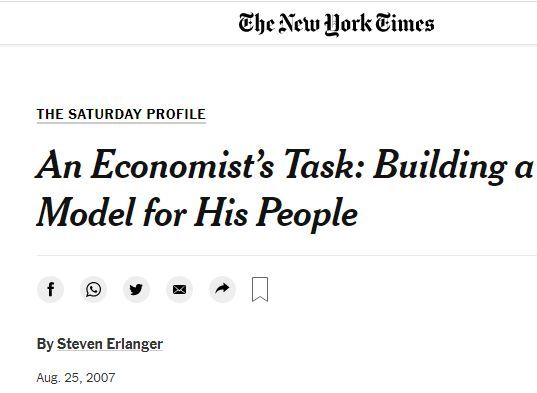Former Palestinian Authority prime minister Salam Fayyad recently stated his belief that in order to run in prospective Palestinian legislative and presidential elections or, more generally, be a member of any Palestinian political entity, one need not accept the three guiding principles of the Quartet — a body made up of representatives from the United States, European Union, Russia and the United Nations.
The Quartet was established to facilitate peace negotiations and laid out basic criteria for the Palestinian leadership to abide by as a basis for talks: namely, to recognize the State of Israel, respect previous diplomatic agreements signed with Jerusalem and renounce violence.
Yet, the New York Times, CNN and other major news organizations that had once praised Fayyad as the personification of a new, moderate, conciliatory Palestinian political echelon have not reported on his apparent rejection of Israel’s right to exist or the need for the Palestinians to adhere to the Oslo Accords and end their support for attacks on Israelis.
New York Times: Fayyad as a Model of Palestinian Moderation
Salam Fayyad is no obscure figure.
Last week, he announced that he would be submitting a list of independent candidates who will run in the May 22 elections for the Palestinian Legislative Council. Fayyad served as the Palestinian Authority finance minister under Yasser Arafat from 2002 to 2005 and, following Hamas’ takeover of the Gaza Strip in an internecine war, was sworn in as prime minister of an emergency West Bank-based Palestinian government on June 15, 2007.
PA President Mahmoud Abbas reappointed him to the position in 2009, a post he held until 2013.
He has been lauded by the media as an economic reformer who cracked down on corruption, while his views on the Israel-Palestinian conflict were deemed a welcomed breath of fresh air.
During Fayyad’s tenure, former New York Times Jerusalem Bureau Chief Steven Erlanger quoted the PA prime minister expressing ostensible support for co-existence with the Jewish state:
It is obvious that Israelis and Palestinians need to live together, he [Fayyad] said. “There should be no question in anybody’s mind in Israel that this is what this is about, in a way that leads to us living like them, as free people, in a country of our own, right next door to them. It’s not that we have to; we want to.”
Join the fight for Israel’s fair coverage in the news
When you sign up for email updates from HonestReporting, you will receive
Sign up for our Newsletter:
Join the fight for Israel’s fair coverage in the news
Not to be outdone, NYT journalist Thomas Friedman portrayed Fayyad as the Palestinians’ democratic savior:
Israel has an Arab awakening in its own backyard in the person of Prime Minister Salam Fayyad of the Palestinian Authority. He is the first Palestinian leader to say: judge me on my performance in improving my peoples’ lives… so Palestinians will be ready for a two-state solution.”
Meanwhile, in his very first interview with a Western network after being appointed prime minister, Fayyad was described by CNN as seeking “intensive and active cooperation” with Israel to ensure that the chaos that had engulfed Gaza did not spread to the West Bank. The related article highlighted Faayad’s hope that negotiations leading to “an independent Palestinian state living side by side with the state of Israel” would soon get back on track.
Related Reading: Media Silent on Abbas Beginning 17th Year of Four-year Term
From Supporting Two States to Rejecting Israel’s Existence?
Though news outlets such as The New York Times incessantly presented Fayyad as a level-headed technocrat whose goal was to increase political and financial transparency while seeking a rapprochement with Israel, his recent embrace of rejectionist views has flown totally under the radar.
In fact, Fayyad — a supposed ‘technocratic revolutionary’ — has essentially adopted positions that dovetail with those of Hamas.
This is a direct quote, taken from his recent interview with Al-Quds:
As for the terms of the Quartet, they must be rejected by all Palestinians and not [only] by Hamas and [Islamic] Jihad. And when I say rejection, I mean it completely, without trying to get around it….”
As for Fayyad’s reasoning, he asserted that accepting the Quartet’s principles would harm the credibility of the Palestinian electoral process and hamper any effort to end the years-long internal Palestinian political division. In other words, doing so would prevent the formation of a government dominated not only by members of Abbas’ ruling Fatah faction but also by Gaza’s terrorist rulers who are dedicated to the Jewish state’s destruction.
Related Reading: Following HonestReporting Petition, US Gov’t Reveals True Number of Palestinian Refugees
That major media organs have failed to acknowledge this development, even as Israel has welcomed the Quartet’s involvement in mediating a peace process geared towards ending the conflict, is part and parcel with news outlets’ seeming refusal to ever hold Palestinian leaders — both past and present — to account for their rejectionism.
Indeed, by reporting on a former prominent Palestinian politician’s provocative stance vis-à-vis Israel, news organizations would be placed in the peculiar position of contradicting the narrative of Palestinian victimhood that they helped to create.
In truth, however, media in free societies have one primary function: that is, to report the facts that, subsequently, allow individuals to draw their own conclusions and form their own opinions.
Liked this article? Follow HonestReporting on Twitter, Facebook, Instagram and TikTok to see even more posts and videos debunking news bias and smears, as well as other content explaining what’s really going on in Israel and the region. Get updates direct to your phone. Join our WhatsApp and Telegram channels!
Featured Image: Wikimedia Commons.



